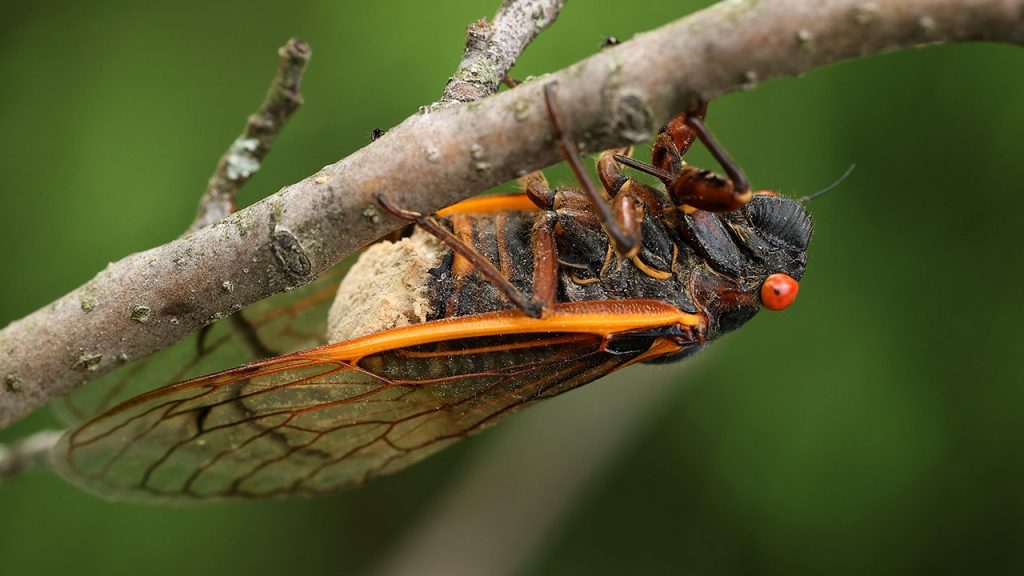This year, two “broods” of cicadas are emerging simultaneously along with reports of a mysterious fungus that is causing cicadas to become “zombies” and display abnormal sexual behaviors. However, experts have clarified that there is nothing to fear. The fungus, Massospora cicadina, infects cicadas, turning the back part of their bodies into spores, which are then spread during mating. The altered behavior caused by the fungus results in infected bugs being referred to as “zombie” cicadas, due to their increased mating efforts and unusual sexual behavior mimicry. Despite the sensationalism, there is no reason for concern as the fungus is harmless to humans and only affects cicadas.
The infected cicadas, while displaying abnormal behaviors, are still very much alive and harmless to humans. The fungus is naturally occurring and specialized to cicadas, meaning it does not pose a threat to other animals or people. While some scientists have referred to infected cicadas as “flying salt shakers of death,” there is no need to be afraid, as handling infected cicadas is safe. The number of infected cicadas remains minimal, and the chance of encountering one is low. Chris Simon, senior research scientist at the University of Connecticut, emphasized that infected cicadas do not eat brains like traditional zombies, further reinforcing that they pose no danger to humans.
Experts like P.J. Liesch from the University of Wisconsin-Madison highlighted the importance of cicadas to the ecosystem and the unique nature of this year’s emergence. Despite the nuisance that cicadas may cause, they play a significant role in the ecosystem, providing food for various animals. Liesch compared witnessing the emergence of cicadas to witnessing a solar eclipse, emphasizing the rarity and special nature of the event. Additionally, Liesch noted that the periodical cicadas in Wisconsin only emerge every 17 years, making this occurrence particularly special for both scientists and the environment.
The fungus that infects cicadas alters their behavior, causing them to exhibit unusual mating behaviors and mimicry of female cicadas. However, it is essential to understand that infected cicadas are harmless and pose no threat to humans. The fungus is specific to cicadas and does not infect other animals or people. While some sensationalize the infected cicadas as “zombies,” experts like Chris Simon and the Field Museum clarify that there is no need to be afraid. The infected cicadas are safe to handle, and the likelihood of encountering one is minimal.
Although the reports of “zombie” cicadas and the mysterious fungus they carry may seem concerning, experts reassure that there is no reason for alarm. The cicadas infected with Massospora cicadina may display unusual behaviors, but they are harmless and pose no threat to humans. The impact of the fungus is confined to the cicadas themselves and does not affect other animals or people. The unique emergence of periodical cicadas serves as an important event for scientists and the environment, showcasing the delicate balance of nature. As the cicadas play a crucial role in the ecosystem, their emergence provides a valuable food source for various animals, contributing to the overall biodiversity and balance of nature.
The cicadas infected with the fungus Massospora cicadina exhibit altered behaviors and sexual mimicry, leading to their characterization as “zombies.” However, experts emphasize that these infected cicadas are harmless and pose no danger to humans. The fungus is specific to cicadas and does not infect other animals or individuals. While the sight of infected cicadas may be unusual, there is no need to fear them. The rarity of the cicadas’ emergence, occurring every 17 years in some regions, provides a unique opportunity to observe and appreciate the natural world’s intricacies. This event, likened to a natural phenomenon like a solar eclipse, highlights the interconnectedness of nature and the significance of even the smallest creatures in maintaining the ecosystem’s balance.


